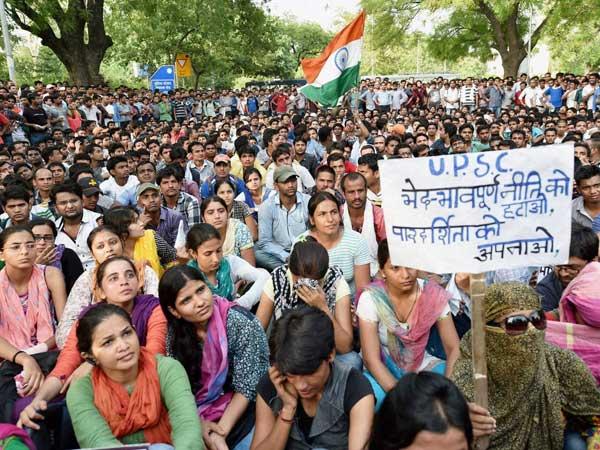
New Delhi, Aug 5: Scores of UPSC aspirants today continued their protest demanding scrapping of CSAT, a day after the government announced that English marks in the test will not be included for gradation or merit in the civil services preliminary examination.
The aspirants, who had been protesting against the CSAT format in Mukherjee Nagar of north Delhi for the past 26 days, have now shifted their base to Jantar Mantar.
Protestors said they would continue their fight unless Centre doesn't scrap CSAT completely. AAP leader Yogendra Yadav was also present at the protest site.
"We are not satisfied with the government's announcement regarding UPSC exams. Government has not fulfilled its promise by proposing such changes. We want Modi-led government to scrap this test completely," Pawan, a protestor, said.
Buckling under pressure of street protests, government had yesterday announced that English marks in CSAT-II will not be included for gradation or merit in the civil services preliminary examination.
The Department of Personnel and Training (DoPT) had said that it will issue a notification to reflect the changes announced by the government which the Union Public Service Commission (UPSC) will implement.
The civil services preliminary examination will be held as scheduled on August 24 with the changes announced by government including non-inclusion of English marks in gradation of candidates.
There are two compulsory papers of 200 marks each in the civil services preliminary examination. These papers are also known as CSAT I and CSAT II.
The CSAT-II paper carries questions on comprehension, interpersonal skills including communication skills, logical reasoning and analytical ability, decision-making and problem- solving, general mental ability, basic numeracy, and English language comprehension skills (of Class X level).
The CSAT pattern was implemented from 2011. The civil services examination is conducted in three stages -- preliminary, main and interview -- to choose candidates for Indian Administrative Service (IAS), Indian Foreign Service (IFS) and Indian Police Service (IPS) among others.





Comments
Add new comment